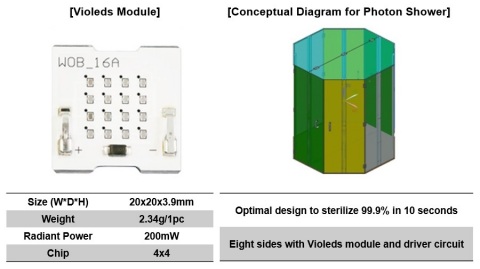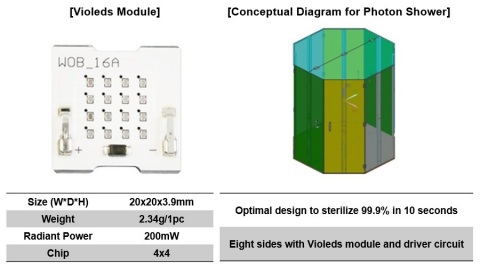ANSAN, South Korea--(BUSINESS WIRE)--Seoul Viosys (KOSDAQ: 092190), a leading compound semiconductor solution provider, announced that it has developed an optimal module designed to sterilize 99.9% of the coronavirus in 3 seconds using “Violeds”, a UV LED technology, and started mass production. Along with this, Seoul Viosys is developing a so-called “Photon Shower” product that is applied with this technology to contribute to the safety of medical staff and patients who have been struggling amid COVID-19 pandemic.
The BIO research team at Seoul Viosys has been carrying out numerous research and development projects with in-house laboratories cultivating and sterilizing various bacteria and viruses. In April 2020, a Violeds sterilization test conducted with a research group of Korea University proved that Violeds does sterilize coronavirus. By applying this technology, Seoul Viosys is producing Air Purifier “VAC,” which is optimally designed to sterilize filters 99.9% in 30 seconds, and Multi Sterilizer “VSM+,” which sterilizes the surface of everyday objects 99.9% in 10 minutes.
The new “Photon Shower” is a whole-body sterilization solution that uses only light, that is, photons, to sterilize various germs on the surface of clothes of people in seconds when they enter the “Photon Shower”. This sterilization function can also be additionally applied to conventional air shower, which is used for dust removal only.
Infections in the hospital are also serious. According to CDC (Centers for Disease Control and Prevention) statistics from the U.S., one of the countries with the most transparent health care system, 14,000 people die annually from hospital infections in the U.S. alone. The pain of patients and their families, medical expenses and social losses are beyond imagination. Photon Shower using Violeds technology is expected to contribute to minimizing infections in hospitals in the future.
“There are countless industrial fields where Violeds module, which sterilizes 99.9% of viruses on the surface of everyday objects in just three seconds, can be applied,” a Seoul Viosys official said. “It has been supplied to U.S. escalator manufacturers to be applied to escalator handle sterilization solutions, and we expect global customer demand to increase in the future,” he said.
Violeds is a UV LED technology that uses only light to sterilize, and is optimally designed depending on application area by considering the following five factors: wavelengths from 200 nm to 400 nm, distance to objects, light irradiation time, brightness of light (intensity), angle and area of irradiation surface. This technology has already been applied to the International Space Station of the National Aeronautics and Space Administration (NASA), and is also applied to various home appliances and automobiles, including air conditioners, air purifiers, water purifiers and dishwashers.
About Seoul Viosys
Seoul Viosys is a full-line solution provider for UV LED, VCSEL (Vertical Cavity Surface Emitting Laser), the next-generation light source for 3D sensor and laser, and a single-pixel RGB “Micro Clean Pixel” for displays. Established in 2002 as a subsidiary of Seoul Semiconductor, it captured No. 1 market share in the UV LED industry (LEDinside, 2018). Seoul Viosys has an extensive UV LED portfolio with all wavelengths ranging from 200nm to 1600nm, including ultraviolet rays (UV), visible rays, and infrared rays. The company holds more than 14,000 patents related to UV LED technology. Violeds, its flagship UV LED technology, provides a wide range of industries with optimal solutions for robust sterilization and disinfection (UV-C), skin regeneration (UV-B), water/air purification and effective cultivation for horticulture. In 2018, Seoul Viosys acquired RayCan, a leading optoelectronic specialist, to add advanced VCSEL technology, which supports smartphone facial recognition and autonomous driving, and has started mass production. In January 2020, it introduced a disruptive “Micro Clean Pixel” that has the potential to be a game-changer in the display market. To learn more, visit http://www.seoulviosys.com/en/.




